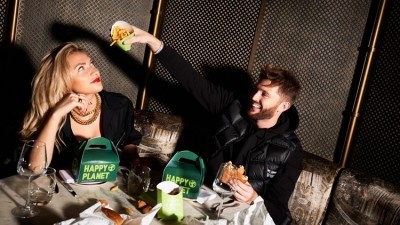generation next
Tiffin(ity) and beyond – how SpiceBox is vying to become the UK’s biggest Indian restaurant group

“I always said we wouldn’t do delivery, ever,” says Grace Regan, wryly, when asked about the past 20-odd months. Had the pandemic never happened, it’s quite possible that SpiceBox, the vegan curry house Regan launched in London’s Walthamstow back in early 2019, would never have branched out into the delivery space; now, though, it seems crazy to think there was a time when it wasn’t part of the business.
“Before the pandemic, we did takeaway, alongside dine in, via our Tiffin Club, which made up about 20% of our revenue,” she explains. “And I always worried that having a delivery stream too would cannibalise our dine-in sales. But lockdown left us with no choice.”
Unlike many of her peers, Regan never closed her business, pivoting immediately to delivery when the first national lockdown was enforced in March last year. Her staff, many of whom lived locally, were able to walk to work, and initially she delivered the meals herself with the help of her business partner, Alpesh Chauhan. But soon the business looked towards third-party platforms to help manage the growing demand – first joining Deliveroo and later UberEats.
“We had a pretty good Covid, if that’s a phrase one can use. We’re a neighbourhood restaurant, which helped. Many other traders initially shut up shop, but there were lots of people in Walthamstow who still wanted to order food and delivery meant we could carry on. We even saw some growth in that period. It was great, we were super busy and really benefitted from the introductory commission rates we got from Deliveroo and Uber. But if we wanted to keep it going in the long run, I wanted to bring the service in house and make sure it was sustainable.”
“We came out of Covid feeling like we had a pretty robust business”
Regan eventually partnered exclusively with zero-emission delivery operator Zedify, and ever since has used its fleet to offer both a standard takeaway menu, as well as bring back the Tiffin Club, whereby customers pay a one-off £10 fee for a four-tier tiffin and meal for two with the tiffin used thereafter for subsequent orders.
“Working with Zedify has been a really positive experience so far. You need volume to make it work, definitely, but it’s a big part of our business now and that’s fair enough. You can’t really be a high street curry house and not offer delivery.”
Growing ambition
The pandemic may have changed Regan’s attitude towards delivery, but it hasn’t altered is her ambition. In February last year, when the threat of Covid still seemed a million miles away, she told Restaurant that she wanted SpiceBox to be ‘the UK’s leading curry house brand’. “I think there can be a SpiceBox on high streets up and down the country,” she said, at the time.
Given the turbulence of the intervening months, it wouldn’t be surprising if Regan had chosen to rein in her plans. But as she’s quick to make clear, growing the business is still very much the intention.
“We came out of Covid feeling like we had a pretty robust business,” she says, assuredly. “The neighbourhood model was always central to our expansion strategy, and the pandemic reinforced that and left us feeling really confident about the future. Obviously, we face the same challenges as everyone else, but that hasn’t diminished our ambition for SpiceBox at all.”
To that end, Regan diligently began looking for a second SpiceBox site once the first lockdown ended, which has now led to the launch of the group’s sophomore restaurant in Leytonstone, just down the road from its original location.
“It feels like a safe bet for a second site. Leytonstone is an area we were targeting from the outset. There’s a similar demographic there, and it already has brand recognition. It’s close to Walthamstow [both are in the borough of Waltham Forest], and we know there’s a lot of demand in the area.”
Go big or go home
SpiceBox Leytonstone may not be much of a risk in terms of location, but its size could pose a challenge. Compared to the 30 covers in Walthamstow, it is a considerably bigger proposition with three times as many seats.
“We were definitely looking for something bigger,” says Regan, quickly assuaging any doubts. “Pre-pandemic it had got to a point where we couldn’t service demand, so we knew the next site needed to be a decent size, including in the kitchen.
“Leytonstone is a big old site, but I’m confident we can fill it. It feels exciting; like we can really lean into what we do and not be restricted by our size.”
The menu at Leytonstone is broadly similar to that served in Walthamstow, with a focus on inventive vegan takes on curry house classics. They include a cashew and coconut korma with seasonal vegetables and pulses; a chick'n tikka masala with tandoori-style, soy-based chicken pieces served in a rich tomato sauce with green peppers; a ‘fiery’ jackfruit vindaloo; and shroom keema with a plant-based mince of chopped mushrooms, lentils and soya that’s freshened with peas.
A larger kitchen has allowed for the introduction of some new ideas, though, which are available exclusively at the Leytonstone restaurant. New dishes to feature include baingan bharta, a whole fire-roasted aubergine served in a spiced tomato sauce and topped with pomegranate seeds; and tandoori-spiced grilled cauliflower steak served with coriander chutney and pomegranate seeds. Prices across the board remain consistent, with curries ranging from £9 to £12, and smaller street bites primarily pitched at between £6.50 and £8.50.
There will also be a return of the SpiceBox weekend brunch menu that includes a ‘full Indian’ with spicy jackfruit beans, crispy Bombay hash, Symplicity sausage, Indian guac, pickled pink onions, date and tamarind chutney, roasted portobello mushroom and toasted sourdough. Having been discontinued at the Walthamstow restaurant since the pandemic hit, the hope is to bring brunch to the original site in early 2022.
In terms of ensuring consistency across the two restaurants, Regan says the pandemic has helped. “At the height of lockdown, we were doing more than we could ever have imagined in terms of volume. It was crazy and re-enforced the importance of consistency.
“Many of our customers were regulars who would usually have come into the restaurant two or three times a week. And often they would order the same thing, so there’s never any room to cut corners. That really pushed us to refine and tighten up our processes, which has helped in our preparations for the second site.”
From tech to tiffin
Regan turned her back on a career at a tech start-up in Silicon Valley to launch SpiceBox. Her first start-up, audio journalist app Clippet News, led her to California in 2015, just two years after leaving university. Yet while living there she quickly became disillusioned with the tech world but discovered a thriving vegan food scene.
Less than a year later, she had returned to London and taken a different path, building a table into her front door and turning her home into an Indian takeaway. She got a five-star food hygiene rating from the council and made her curries available on delivery platforms Quickup and Take Eat Easy (the latter has since folded in the face of competition from larger delivery platforms). Street food residencies with Kerb followed, and in 2017 SpiceBox secured £450,000 funding from investment group 2enable Partners that eventually led to the launch of the Walthamstow restaurant.
With Leytonstone now open too, Regan’s mind is turning to further expansion, with the lease for a third site already in the final stages of sign off. The expectation is that the restaurant will open in early 2022.
One noticeable difference in SpiceBox’s expansion strategy pre and post pandemic is location. Before Covid, Regan was focused on looking away from London to build the business, targeting commuter belts outside the M25 such as Hertfordshire and Essex, but that has since changed.
“When I first begun looking for a second restaurant, I did a lot of pavement plodding in market towns and put down a decent amount of offers on sites, but it never amounted to anything,” she says, when asked about the change in tack. “It takes a long time, for me particularly, to find a new restaurant. I’ve got to be really sure it’s a safe bet. The business is still too young to be taking big risks. That’s what turned me back to exploring the London neighbourhood areas.”
Regan confirms that the third restaurant will be in the capital, but after that she’s not averse to looking beyond London again. “If we see substantial demand from Leytonstone and the next one then that’ll certainly put the wind in our sails. Having three really successful sites running in the capital means we can get to a place where we have a successful restaurant outside of it too.”
The staffing challenge
A key concern across the industry right now is recruitment, but it’s long been a particularly prevalent issue for Britain’s Indian restaurants. Historic immigration rules have made it both difficult and expensive to sponsor visas for chefs from outside the EU, and in 2017 the Asian Catering Federation warned that half of the country’s curry houses could close within 10 years due to a cocktail of issues including a shortage of skilled chefs.
“We’re trying to be imaginative, but staffing is really tough at the moment”
From the beginning, Regan’s approach to staffing has been inventive and broadminded, focusing ‘hyper locally’ and encouraging those who have great attitudes and passion for the food to try out for roles, even if they don’t necessarily have a robust amount of past experience. She’s also taken part in local charity and college initiatives to encourage more people into the sector. “We’re trying to be imaginative, but it is really tough at the moment,” she says, with a notable pang of frustration.
Another challenge for SpiceBox as it looks to scale is fortifying its commitment to sustainability. The group works with First Mile recycling to make sure as much waste as possible is recycled. Anything that cannot be is then sent off to be burned and converted into energy.
“If you’re constantly prioritising these things and they’re at the forefront then you have to work out how to make them work. It’s the same with the delivery. I’m not going to say we’ll never use a third party if need be, but the ultimate goal would be to work with Zedify and keep it in house as we grow.
“It’s about partnering with the right people and making sure that relationship is maintained. Letting these things slide is easy, but I’m committed to making sure that doesn’t happen.”
Continuing to crowdfund
In October 2019, SpiceBox launched a crowdfunding drive on online investment platform Seedrs and hit its £275,000 target in just five hours, eventually raising just shy of £340,000. Much of this money has been used to help get the second restaurant open, as well as develop a retail line of ready-prepared dhals and chutneys that recently launched into two wholesale distributors that both have nationwide reach.
A second fundraise was launched earlier this month, which will go towards getting the third restaurant open, and possibly securing a fourth. It will also be used to help scale production of the retail lines.
Regan won’t be drawn exactly on how big SpiceBox’s restaurant estate can grow, but she’s optimistic for the future. “We definitely want to continue opening sites and growing, but I don’t want to run before I can walk.
“Five years down the line I’d like to be creeping towards the 10-site mark. We’ve got to be ambitious and keep growing, but not at the sacrifice of what makes our business good. We have to maintain those things.”


![Spicebox_Grace_Regan_standing[1]](/var/wrbm_gb_hospitality/storage/images/media/images/spicebox_grace_regan_standing-1/4555424-1-eng-GB/Spicebox_Grace_Regan_standing-1.jpg)






















